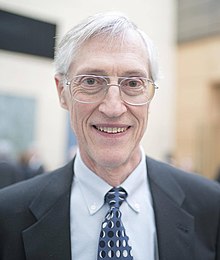John C. Mather
| John Cromwell Mather | |
|---|---|

John C. Mather (March 2015)
|
|
| Born |
August 7, 1946 Roanoke, Virginia, USA |
| Residence | United States |
| Nationality | United States |
| Fields | Astrophysics, cosmology |
| Institutions |
NASA University of Maryland |
| Alma mater |
Swarthmore College University of California, Berkeley |
| Doctoral advisor | Paul L. Richards |
| Known for | Cosmic microwave background radiation studies |
| Notable awards |
Dannie Heineman Prize for Astrophysics (1993) Nobel Prize in Physics (2006) |
John Cromwell Mather (born August 7, 1946, Roanoke, Virginia) is an American astrophysicist, cosmologist and Nobel Prize in Physics laureate for his work on the Cosmic Background Explorer Satellite (COBE) with George Smoot.
This work helped cement the big-bang theory of the universe. According to the Nobel Prize committee, "the COBE-project can also be regarded as the starting point for cosmology as a precision science."
Mather is a senior astrophysicist at the NASA Goddard Space Flight Center (GSFC) in Maryland and adjunct professor of physics at the University of Maryland College of Computer, Mathematical, and Natural Sciences. In 2007, Mather was listed among Time magazine's 100 Most Influential People in The World. In October, 2012, he was listed again by Time magazine in a special issue on New Space Discoveries as one of 25 most influential people in space.
Mather is also the project scientist for the James Webb Space Telescope (JWST), a space telescope scheduled to be launched to Lagrange Point L2 in 2018.
In 2014, Mather delivered an address on the Webb Space Telescope at the second Starmus Festival in the Canary Islands.
...
Wikipedia
